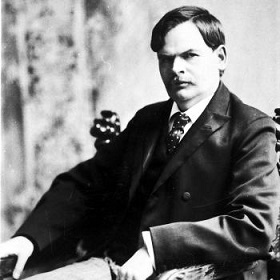De Canadese dichter en schrijver William Wilfred Campbell werd geboren rond 1 juni 1858 in Berlin, Ontario, tegenwoordig Kitchener. De zoon van dominee Thomas Swainston Campbell groeide op in verschillende kleine steden in Ontario. Hij ging van 1877 tot 1879 naar de Highschool in Owen Sound en behaalde een leraarscertificaat. Vanaf 1882 studeerde hij aan University College van de Universiteit van Toronto, en vervolgens theologie aan Wycliffe College en de Episcopal Theological School iin Cambridge. In 1885 werkte Campbell als diaken in West Claremont / New Hampshire; In 1886 werd hij benoemd tot pastor. In 1888 werd hij rector van Trinity Church in St. Stephen / New Brunswick, 1890 rector van St. Paul’s Church in Southampton / Ontario. In 1891 kreeg hij een baan bij het ministerie van Spoorwegen en Kanalen in Ottawa, in 1892, trad hij toe tot het departement van Buitenlandse Zaken, in het volgende jaar tot het Ministerie van Militie en Defensie en in 1897 tot het Privy Council Office. In 1908 kreeg hij een functie in het archief van het ministerie van Landbouw, die hij tot zijn dood bekleedde. Campbell’s eerste dichtbundel “Poems” verscheen tijdens zijn studententijd in 1881. Tussen 1881 en 1888 werden verscheidene gedichten gepubliceerd in het tijdschrift Varsity. Zijn eerste publicatie in een groot tijdschrift (Atlantic Monthly) was “Canadian Folk Song” (1885). In 1888 verscheen de bundel “Snowflakes and sunbeams”, met o.a. het gedicht “Indian Summer” – een van de populairste Canadees gedichten tot op heden. Een jaar later volgde de bundel “Lake lyrics and other poems”. 1893 verscheen “The dread voyage”. In 1894 werd Campbell toegelaten tot de Royal Society of Canada, waarin hij tot 1911 verschillende functies bekleedde.. Vanaf 1895 schreef hij zeven vers drama’s. De eerste twee verschenen in 1895 onder de titel “Mordred and Hildebrand: a book of tragedies”: Na 1900 ontstonden zijn drie romans “Ian of the Orcades (1906), “A beautiful rebel” (1909) en “Richard Frizzell”.
How One Winter Came In The Lake Region
For weeks and weeks the autumn world stood still,
Clothed in the shadow of a smoky haze;
The fields were dead, the wind had lost its will,
And all the lands were hushed by wood and hill,
In those grey, withered days.
Behind a mist the blear sun rose and set,
At night the moon would nestle in a cloud;
The fisherman, a ghost, did cast his net;
The lake its shores forgot to chafe and fret,
And hushed its caverns loud.
Far in the smoky woods the birds were mute,
Save that from blackened tree a jay would scream,
Or far in swamps the lizard’s lonesome lute
Would pipe in thirst, or by some gnarlèd root
The tree-toad trilled his dream.
From day to day still hushed the season’s mood,
The streams stayed in their runnels shrunk and dry;
Suns rose aghast by wave and shore and wood,
And all the world, with ominous silence, stood
In weird expectancy:
When one strange night the sun like blood went down,
Flooding the heavens in a ruddy hue;
Red grew the lake, the sere fields parched and brown,
Red grew the marshes where the creeks stole down,
But never a wind-breath blew.
That night I felt the winter in my veins,
A joyous tremor of the icy glow;
And woke to hear the north’s wild vibrant strains,
While far and wide, by withered woods and plains,
Fast fell the driving snow.
In My Study
Out over my study,
All ashen and ruddy,
Sinks the December sun;
And high up over
The chimney’s soot cove,
The winter night wind has begun.
Here in the red embers
I dream old Decembers,
Until the low moan of the blast,
Like a voice out of Ghost-land,
Or memory’s lost-land,
Seems to conjure up wraiths of the past.
Then into the room
Through the firelight and gloom,
Some one steals,—let the night-wind grow bleak,
And ever so coldly,—
Two white arms enfold me,
And a sweet face is close to my cheek.

Wilfred Campbell (1 juni 1858 – 1 januari 1918)
